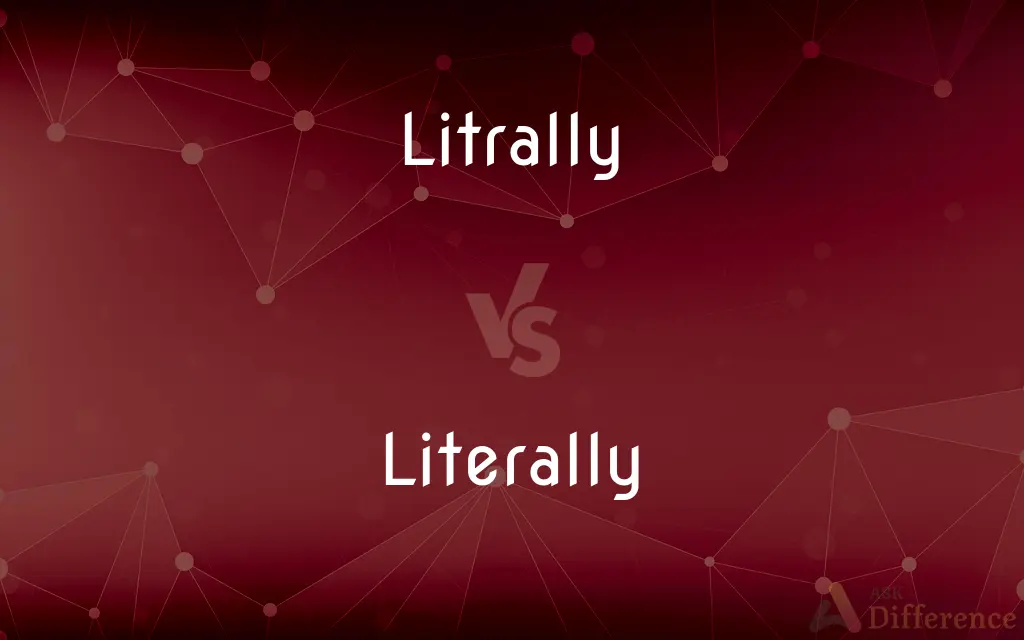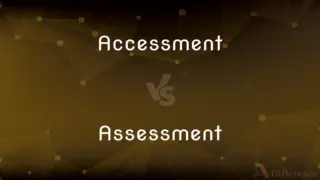Litrally vs. Literally — Which is Correct Spelling?
Edited by Tayyaba Rehman — By Fiza Rafique — Updated on March 30, 2024
"Litrally" is a misspelling. "Literally" is the correct spelling, denoting an exact and true manner or sense.

Table of Contents
Which is correct: Litrally or Literally
How to spell Literally?

Litrally
Incorrect Spelling

Literally
Correct Spelling
ADVERTISEMENT
Key Differences
"Litrally" lacks the 'e' from "true."
Remember the word "literature" – it starts with "liter," just like "literally."
Double the 'l' and add 'y' to "literal" to get "literally."
"Literal" means true or exact, and it has "literal" inside "literally."
Think of it as "lit-er-al-ly," breaking it down to its components.
ADVERTISEMENT
How Do You Spell Literally Correctly?
Incorrect: I was litrally the last person to leave.
Correct: I was literally the last person to leave.
Incorrect: They litrally just finished the project.
Correct: They literally just finished the project.
Incorrect: He litrally exploded with anger.
Correct: He literally exploded with anger.
Incorrect: She litrally can't stop laughing.
Correct: She literally can't stop laughing.
Incorrect: We were litrally soaked by the rain.
Correct: We were literally soaked by the rain.
Literally Definitions
Used for emphasis or to express strong feeling.
I literally can't believe this happened.
In a manner that exactly follows the meaning of the words.
The play was literally a word-for-word adaptation of the novel.
In its standard or primary sense.
The word dog literally means a domesticated carnivore.
In a strict sense, without exaggeration.
I was literally the last person in line.
Precisely or just as stated.
He literally missed the bus by seconds.
In a literal manner; word for word
Translated the Greek passage literally.
In a literal or strict sense
Don't take my remarks literally.
Actually; in effect; practically. Used as an intensive to emphasize a figurative statement in an exaggerated way
“There are people in the world who literally do not know how to boil water” (Craig Claiborne). I was so angry that my heart literally exploded with rage.
Word for word; not figuratively; not as an idiom or metaphor.
When I saw on the news that there would be no school tomorrow because of the snowstorm, I literally jumped for joy, and hit my head on the ceiling fan.
Used non-literally as an intensifier for figurative statements: virtually, so to speak (often considered incorrect; see usage notes)
He was so surprised, he literally jumped twenty feet in the air.
My daughter's pet rabbit had babies, and now we've literally got rabbits coming out of our ears.
On 9/11 people were literally glued to their TV sets.
(colloquial) Used to intensify or dramatize non-figurative statements.
I had no idea, so I was literally guessing.
I was literally having breakfast when she arrived.
She was literally like, "What?", and I was literally like, "Yeah".
Literally who is this?
(colloquial) Used as a generic downtoner: just, merely.
It's not even hard to make—you literally just put it in the microwave for five minutes and it's done.
It won't take me long to get back, cause the store's literally two blocks away.
According to the primary and natural import of words; not figuratively; as, a man and his wife can not be literally one flesh.
With close adherence to words; word by word.
So wild and ungovernable a poet can not be translated literally.
In a literal sense;
Literally translated
He said so literally
(intensifier before a figurative expression) without exaggeration;
Our eyes were literally pinned to TV during the Gulf war
Literally Meaning in a Sentence
She literally jumped for joy when she heard the news.
She literally didn't know which way to turn.
The book he recommended was literally a page-turner.
She literally spilled the beans when she knocked over the jar.
I was literally on the edge of my seat during the entire movie.
The puppy was so cute, it literally melted her heart.
The temperature was so high, it was literally like an oven outside.
The team literally went back to the drawing board to redesign the product.
They literally went over the presentation with a fine-tooth comb.
The city was literally a ghost town during the early hours of the morning.
After running the marathon, he was literally running on empty.
The view from the top of the mountain was literally breathtaking.
He was so fast, he literally flew past the finish line.
She literally lit up the room with her smile.
He said he was literally starving, though it had only been a few hours since breakfast.
It was literally raining cats and dogs, making it impossible to step outside without getting drenched.
The comedian was so funny, he literally had the audience in stitches.
The concert was so loud, it was literally deafening.
The garden was literally a paradise on earth with all the blooming flowers.
I was so scared, my heart was literally in my mouth.
The new law literally opens the door for many to get justice.
She literally painted the town red for her 21st birthday celebration.
They literally rolled out the red carpet for the visiting dignitaries.
The news was so shocking, it literally took my breath away.
The bookshelf was literally overflowing with books.
Literally Idioms & Phrases
Literally in the same boat
In the same situation or facing the same challenges.
When it comes to needing more vacation time, we're literally in the same boat.
Literally on fire
Often used to emphasize that something is performing exceptionally well, not actually burning.
The team was literally on fire during the championship game.
Literally speechless
So surprised or shocked that one cannot find the words to respond.
The surprise party left her literally speechless.
Literally on the edge of one's seat
Very excited and giving one's full attention, usually during a suspenseful moment in entertainment or sports.
The thriller was so intense, I was literally on the edge of my seat the whole time.
Literally a stone's throw away
Very close in distance.
The coffee shop is literally a stone's throw away from my house.
Literally over the moon
Extremely happy or delighted about something.
He was literally over the moon when he got the job offer.
Literally blew my mind
Made one extremely impressed or astonished.
The finale of the series literally blew my mind.
Common Curiosities
What is the verb form of Literally?
There isn't a verb form for "literally."
Which vowel is used before Literally?
Any vowel can precede it depending on the context.
What is the root word of Literally?
"Literal."
Why is it called Literally?
It is derived from "literal," meaning true to the strictest sense of a word or phrase.
Which preposition is used with Literally?
Any can be used, but "in" as in "in a literal sense" is common.
Which conjunction is used with Literally?
Any conjunction can be used, depending on context.
Is Literally an abstract noun?
No.
What is the pronunciation of Literally?
ˈlɪtərəli.
Is Literally a noun or adjective?
Neither, it's an adverb.
Is Literally a countable noun?
No.
What is the singular form of Literally?
Literally (it doesn't have a singular or plural form).
Is Literally an adverb?
Yes.
Is Literally a negative or positive word?
Neutral.
How many syllables are in Literally?
Four.
Which determiner is used with Literally?
"This," "that," etc., can be used, depending on context.
Is the word “Literally” a Direct object or an Indirect object?
It can be neither; it's an adverb.
How do we divide Literally into syllables?
Lit-er-al-ly.
What is a stressed syllable in Literally?
Lit.
Which article is used with Literally?
Neither "a" nor "the" typically precedes "literally."
Is Literally a collective noun?
No.
What part of speech is Literally?
Adverb.
What is the opposite of Literally?
Figuratively.
How is Literally used in a sentence?
She was literally over the moon with joy.
Is Literally a vowel or consonant?
It's a word containing both vowels and consonants.
Is the Literally term a metaphor?
No.
Is the word Literally imperative?
No.
Is the word Literally a gerund?
No.
What is another term for Literally?
Actually.
Share Your Discovery

Previous Comparison
Ladys vs. Ladies
Next Comparison
Accessment vs. AssessmentAuthor Spotlight
Written by
Fiza RafiqueFiza Rafique is a skilled content writer at AskDifference.com, where she meticulously refines and enhances written pieces. Drawing from her vast editorial expertise, Fiza ensures clarity, accuracy, and precision in every article. Passionate about language, she continually seeks to elevate the quality of content for readers worldwide.
Edited by
Tayyaba RehmanTayyaba Rehman is a distinguished writer, currently serving as a primary contributor to askdifference.com. As a researcher in semantics and etymology, Tayyaba's passion for the complexity of languages and their distinctions has found a perfect home on the platform. Tayyaba delves into the intricacies of language, distinguishing between commonly confused words and phrases, thereby providing clarity for readers worldwide.


































